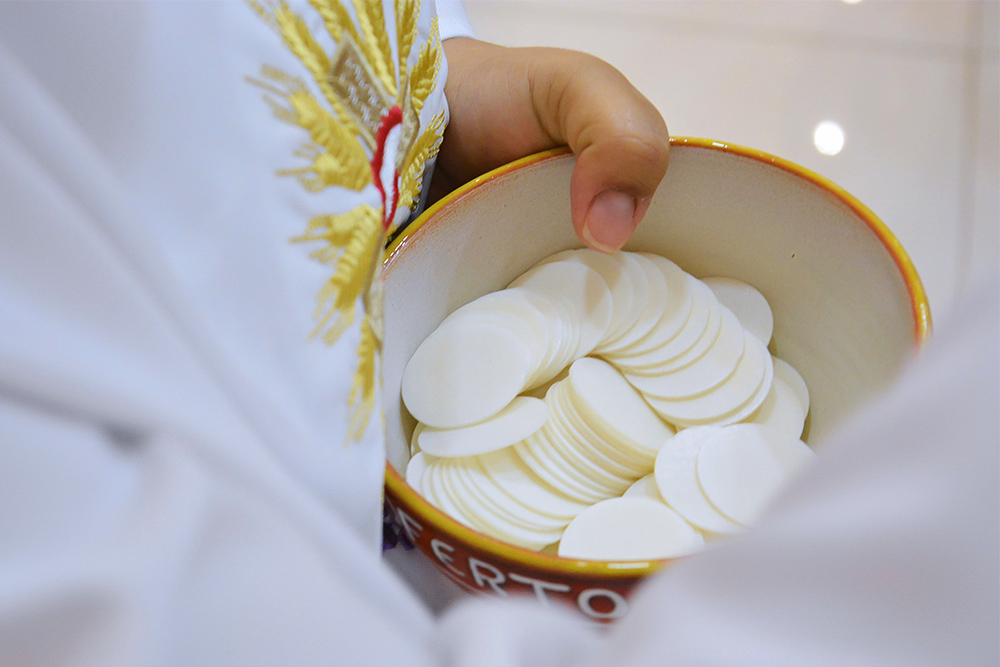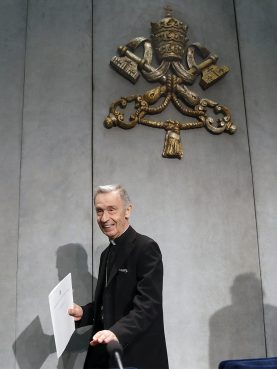(RNS) — Last week, the United States Conference of Catholic Bishops released a short Q&A designed to quiet concern about what might be called the real presence of politics in its decision to draft a document on the Eucharist.
The reason for developing the document now, the USCCB explained, is “to reignite Eucharistic faith in our country.” The bishops did not vote to ban politicians from taking Communion. Plus: “There will be no national policy on withholding Communion from politicians.” And oh, by the way, the Vatican didn’t tell the bishops “not to move forward on drafting the document.”
That adds up to one truth, two fibs, and a promise.
The truth is that there was never going to be a vote on banning politicians from taking Communion. The fibs are a bit more complicated.
Back on March 1, the USCCB president, Archbishop José Gomez of Los Angeles, wrote a memo to his fellow bishops announcing actions taken on two recommendations from the committee he created after the 2020 election to address conflicts that might arise with policies put forward by then-President-elect Joe Biden.

Holy Communion is offered. Photo by Lininha_bs/Creative Commons
The second recommendation — to develop “a document addressed to all of the Catholic faithful on eucharistic coherence” — had been sent to the bishops’ Committee on Doctrine, Gomez wrote, “in the hope that it will strengthen an understanding and deepen a common faith in the gift that has been given to us in the Sacrament of the Altar.”
However the expression of that hope is exegeted, there’s no question that the Committee on Doctrine (headed by Kevin C. Rhoades, the ultraconservative bishop of Fort Wayne-South Bend, Indiana) aimed to pronounce on the issue of Communion for pro-choice elected officials. Here’s how the head of the Vatican’s Congregation for the Doctrine of the Faith in Rome, Cardinal Luis Ladaria, began his response to the FYI letter Gomez sent to the CDF:
Thank you for your letter of March 30, 2021 informing this Congregation that the bishops of the United States are preparing to address the situation of Catholics in public office who support legislation allowing abortion, euthanasia, or other moral evils. We are grateful that you plan to send us a draft of a document on worthiness to receive Holy Communion for an informal review prior to its submission to the body of bishops for vote.
Long story short, the proximate cause for developing this document was Biden’s election and the issue of Communion for pro-choice politicians, not the reigniting of Eucharistic faith.

Archbishop Luis Ladaria, Prefect of the Congregation for the Doctrine of the Faith, arrives to present a document at the Vatican on May 17, 2018. (AP Photo/Alessandra Tarantino)
Ladaria’s response goes on to lay out an elaborate process of “extensive and serene” dialogue — among bishops, between individual bishops and pro-choice Catholic politicians in their dioceses, with bishops’ conferences in other countries — prior to the development of a national policy on worthiness for Communion. Such a policy, moreover, should be framed in such a way as to apply to all the faithful and must reflect “a true consensus” of the bishops.
Did this amount to an instruction from the Vatican “not to move forward on drafting the document”? Gomez & Co. evidently thought so, because they now promise they won’t do what they told the CDF they would.
Prior to their meeting two weeks ago, 67 U.S. bishops signed a letter asking that discussion of going ahead with the document be delayed, and there was powerful pushback against the proposal from some the country’s leading prelates during the meeting itself. “Once we legitimize public-policy-based exclusion,” declared San Diego Bishop Robert McElroy, “we’ll invite all political animosity into the heart of the Eucharistic celebration.”
Ergo, according to Gomez’s reply to the objectors, the document would be about the “meaning of the Eucharist in the life of the church.”
So how trustworthy is the promise not to create a national policy opposing Communion for pro-choice Catholic politicians? Because the same Committee on Doctrine that set out to develop one is in charge of drafting the document, I’d say not completely.






